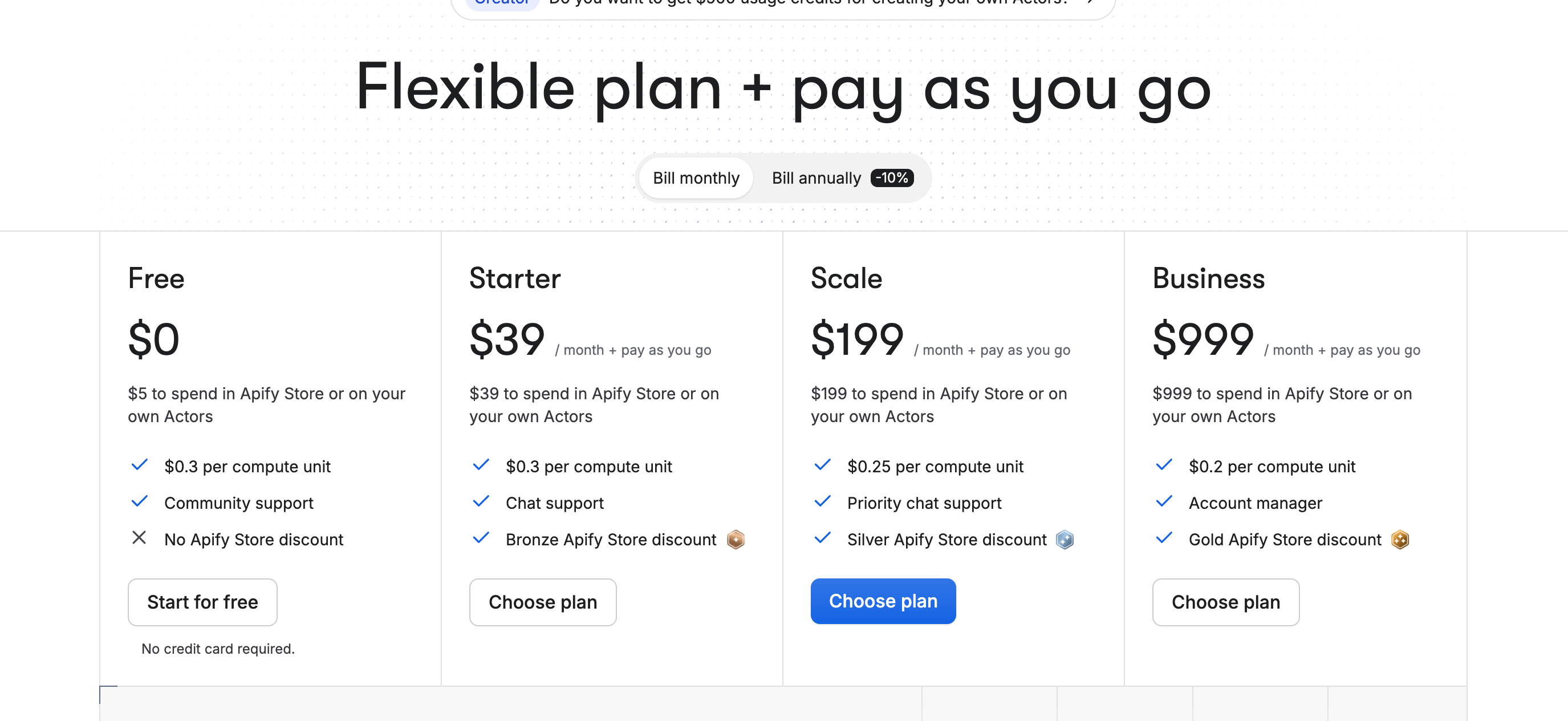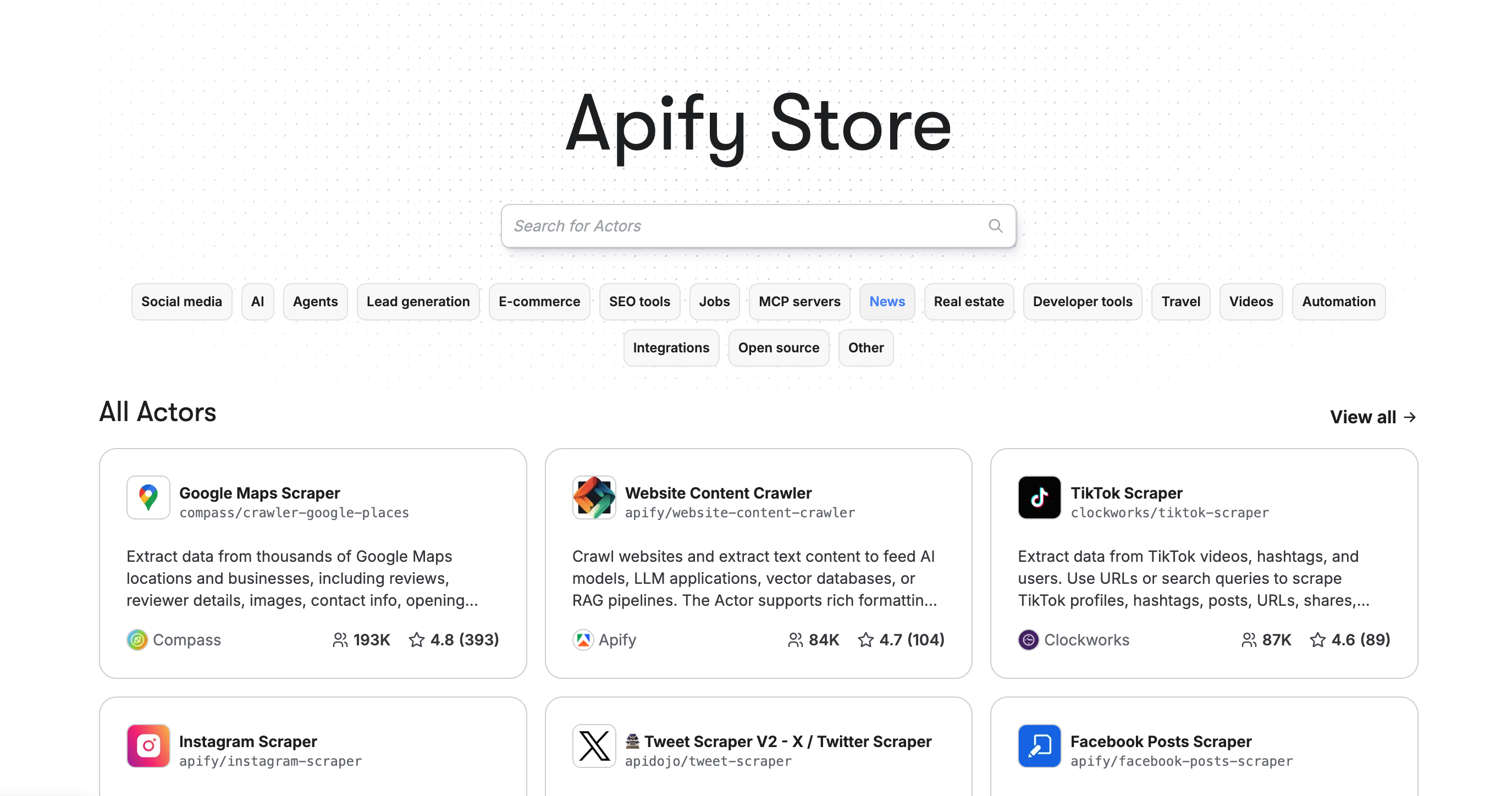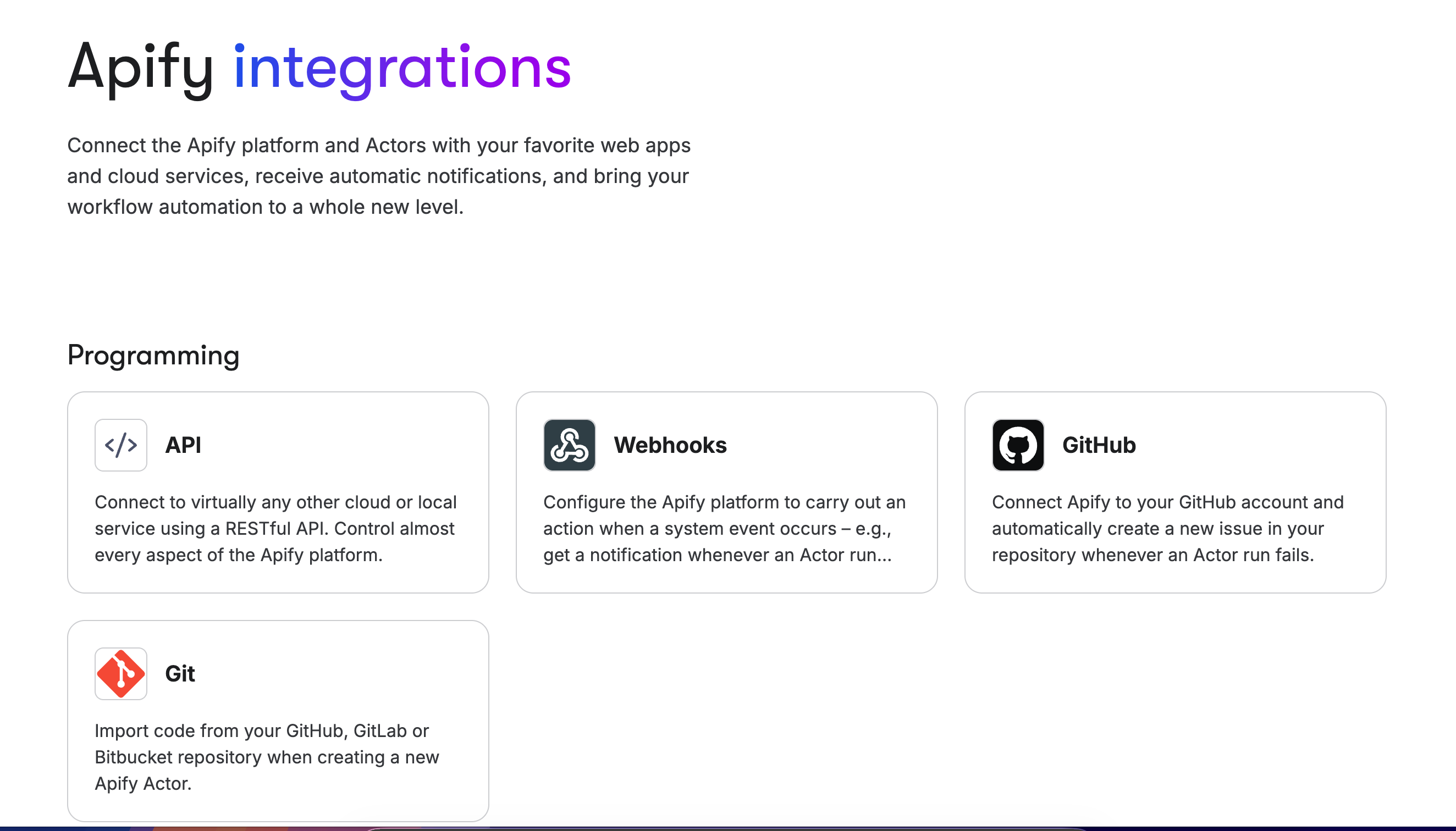TEST AND REVIEW APIFY 2026: THE WEB SCRAPING PLATFORM THAT SCALES YOUR DATA EXTRACTION
Apify is a cloud-based web scraping and automation platform that enables businesses to extract data from any website or social media at scale. Thanks to its marketplace of 1500+ pre-built Actors (ready-to-use scrapers), its robust REST API, and its pay-as-you-go pricing model, this tool transforms data collection into a truly industrialized process. Whether you need to scrape Google Maps, TikTok, Instagram, or build custom scrapers, our Apify agency provides the infrastructure to run extractions in the cloud without managing servers.
In this comprehensive test, we analyze in depth the features, pricing structure, real performance, and limitations of Apify. We tested several Actors including the TikTok Scraper, evaluated the compute units pricing model, and compared it to alternatives like PhantomBuster and Bright Data. This review is designed for growth marketers, data analysts, and technical teams looking for a scalable scraping solution. Discover our detailed review based on real-world usage across multiple client projects.


OUR REVIEW OF APIFY IN SUMMARY

Review by our Expert – Romain Cochard CEO of Hack’celeration
Overall rating
Apify positions itself as a professional-grade scraping infrastructure for teams that need scale and reliability. We particularly appreciate the 1500+ pre-built Actors that cover 90% of common use cases and the compute units model that makes costs predictable. It’s a tool we recommend without hesitation for growth teams running regular data extraction campaigns and companies needing to industrialize their web scraping operations beyond basic tools.
Ease of use
Apify has a learning curve but rewards the investment. Using pre-built Actors from the Store is straightforward: select your Actor, configure parameters, and launch. We got the TikTok Scraper running in under 10 minutes with zero code. However, understanding compute units, proxy settings, and concurrent runs requires technical knowledge. The platform is clearly designed for developers and technical marketers, not complete beginners. Documentation is extensive with 200+ tutorials, but you’ll spend a few hours mastering the ecosystem before being truly efficient.
Value for money
The compute units model is smart and cost-effective at scale. Free plan includes $5 of credits to test, Starter at $39/month fits small projects, and Scale at $199/month handles serious volume with $0.25/unit pricing. We ran 50,000 TikTok profiles extractions for roughly $60 in compute units, which beats hiring a VA or using per-request pricing competitors. The real value is avoiding infrastructure costs: no servers to manage, proxies included, automatic retries handled. For teams running weekly or daily scraping jobs, Apify becomes cheaper than building in-house after the first month.
Features and depth
This is where Apify dominates. The Store offers 1500+ ready-to-use Actors covering Google Maps (193K users, 4.8 stars), Instagram, LinkedIn, Amazon, and virtually every major platform. Each Actor is production-tested with real user ratings. The Google Maps Scraper extracts business data, reviews, and coordinates at industrial scale. Website Content Crawler is optimized for AI training and data lakes. Beyond pre-built tools, you can create custom Actors in JavaScript or Python, schedule runs with cron expressions, chain Actors together, and export to 15+ formats including JSON, CSV, and direct integrations. We use Apify for client projects requiring 100K+ data points monthly.
Customer support and assistance
Support quality scales with your plan. Free users get community Discord (response in 12-24h). Starter unlocks chat support which responded in 4 hours when we had a proxy issue. Scale plan includes priority support that solved a complex scraping problem in under 2 hours with custom code examples. Business plan adds a dedicated account manager for strategy calls. The knowledge base is genuinely useful with 200+ articles, video tutorials, and Actor-specific documentation written by developers who actually use the platform. We never felt abandoned, even debugging complex residential proxy configurations.
Available integrations
Apify integrates seamlessly into technical workflows through multiple channels. The RESTful API allows triggering runs, fetching datasets, and managing Actors programmatically from any environment. Webhooks send real-time notifications to Slack, Zapier, or your backend when runs complete or fail. The GitHub integration automatically creates issues when an Actor crashes, which saved us hours debugging client projects. Git support imports code directly from GitHub, GitLab, or Bitbucket when building custom Actors. We connected Apify to Airtable, Google Sheets, Make.com, and our internal CRM via API with zero friction. Native integrations with Airbyte and Keboola cover data warehouse needs.

Test Apify – Our Review on Ease of use
We tested Apify in real conditions across 5 client projects requiring social media scraping and competitive intelligence. The platform sits in a middle ground: easier than coding scrapers from scratch, but more technical than no-code tools like PhantomBuster. If you’re comfortable with APIs and JSON, you’ll be productive in a day.
Using pre-built Actors is genuinely simple. We launched the TikTok Scraper by pasting URLs, selecting data fields, and clicking Run. Results appeared in 3 minutes with clean JSON output. The Google Maps Scraper extracted 5,000 restaurant listings with reviews in under an hour, no configuration headaches. Each Actor has an intuitive input form with tooltips explaining every parameter. What’s smart: you can test with the $5 free credits before committing.
The learning curve hits when you need advanced features. Understanding compute units consumption, choosing between datacenter and residential proxies, setting up concurrent runs, and optimizing memory allocation requires reading documentation. We spent 2 hours learning the proxy system to avoid TikTok blocks. Creating custom Actors demands JavaScript or Python skills and knowledge of Puppeteer or Playwright. The platform assumes technical literacy that junior marketers might lack.
Verdicts: excellent for technical teams and agencies running regular data extraction campaigns. If you’re a solo marketer with zero dev experience, start with pre-built Actors and expect a 3-4 hour onboarding. The platform rewards learning with industrial-grade capabilities.
➕ Pros / ➖ Cons
✅ 1500+ pre-built Actors covering major platforms (TikTok, Google Maps, LinkedIn)
✅ Clean interface with visual run logs and dataset preview
✅ Free $5 credits to test before paying
✅ Extensive documentation with 200+ tutorials and video guides
❌ Technical learning curve for proxies, compute units, and advanced configs
❌ Not beginner-friendly compared to pure no-code tools
❌ Complex pricing model requires understanding compute unit consumption
Test Apify: Our Review on Value for money

Apify’s pricing is transparent but requires mental math to estimate real costs. The compute units model charges based on actual CPU/memory usage during scraping, not per request or monthly limits. This makes costs predictable at scale once you understand consumption patterns. The Free plan includes $5 to spend in the Apify Store with $0.30 per compute unit and community support, perfect for testing 2-3 Actors and validating the platform fits your needs.
Paid plans start at $39/month for Starter, which includes chat support and a bronze discount dropping compute units to $0.30. The real value appears at $199/month with the Scale plan offering priority chat support and a silver discount at $0.25 per unit. We ran 50,000 TikTok profile extractions consuming roughly 240 compute units, costing $60 on top of the Scale subscription. Business plan at $999/month includes an account manager and gold discount at $0.20 per unit, justified only for teams running 500K+ monthly extractions.
Compared to alternatives, Apify wins at volume. PhantomBuster charges per execution with hard caps, hitting $500/month quickly for serious usage. Bright Data has higher proxy costs but more raw power. For a growth team scraping 100K data points monthly, Apify costs $250-400 total versus $600+ on competitor platforms. The compute units transparency lets you optimize Actor code to reduce costs, something impossible with fixed per-request pricing.
Verdict: best value for teams running regular, high-volume scraping campaigns. Solo users with occasional needs might find per-execution tools simpler. The free plan is genuinely usable for testing and small projects up to 5-10K data points monthly.
➕ Pros / ➖ Cons
✅ Compute units model makes costs predictable at scale
✅ Free plan with $5 credits genuinely usable for testing
✅ Price/performance ratio beats competitors above 50K monthly extractions
✅ No hidden proxy costs included in compute unit pricing
❌ Complex cost estimation requires understanding compute unit consumption
❌ Costs scale quickly for poorly optimized custom Actors
❌ Higher entry price than simple per-execution tools for casual users
Test Apify – Our Review on Features and depth

This is where Apify absolutely crushes the competition. The Apify Store functions as a marketplace of production-tested scrapers, each an Actor built by developers and validated by thousands of real users. We tested 8 different Actors across client projects, and the quality is consistently high. Google Maps Scraper (4.8 stars, 193K users) extracts business names, addresses, phone numbers, reviews, and coordinates from any search query. We used it to build a 10K restaurant database in 3 hours, something that would take days manually.
The Website Content Crawler is optimized for AI training and data lakes, crawling entire sites while respecting robots.txt and handling JavaScript-heavy pages. TikTok Scraper (87K users) extracts video metadata, hashtags, user profiles, and engagement metrics without hitting rate limits, thanks to built-in proxy rotation. Each Actor shows real user ratings, total runs, and average runtime, letting you evaluate reliability before use. Beyond social media, Actors cover e-commerce (Amazon, Shopify), job boards (LinkedIn, Indeed), news sites, and custom scraping scenarios.
For custom needs, you can create Actors in JavaScript or Python using the Apify SDK. The platform provides headless Chrome, Playwright, and Puppeteer pre-configured with residential proxies, captcha solving, and automatic retries. We built a custom Actor scraping a niche B2B directory in 6 hours, faster than expected thanks to template code and debugger tools. Scheduling runs with cron expressions, chaining Actors to process data pipelines, and exporting to 15+ formats (JSON, CSV, Excel, XML) cover enterprise use cases.
Verdict: the deepest feature set we’ve tested in web scraping platforms. The combination of 1500+ ready-to-use Actors and custom development flexibility means Apify handles 95% of scraping scenarios without external tools. It’s genuinely production-grade infrastructure.
➕ Pros / ➖ Cons
✅ 1500+ production-tested Actors with user ratings and usage stats
✅ Google Maps Scraper extracts location data at industrial scale (193K users)
✅ Custom Actor development in JavaScript/Python with full SDK support
✅ Advanced features including scheduling, chaining, and 15+ export formats
❌ Overwhelming choices in the Store for beginners
❌ Actor quality varies depending on maintainer activity
❌ Custom development requires coding skills to unlock full potential
Test Apify: Our Review on Customer support and assistance
Support quality at Apify scales directly with your subscription tier, which feels fair given the pricing structure. Free users access the community Discord with 8,000+ active developers and the Apify team monitoring common questions. We posted a proxy configuration question and received a helpful response within 18 hours from both community members and an Apify engineer. The knowledge base contains 200+ articles covering setup, Actor development, proxy management, and troubleshooting.
Upgrading to Starter ($39/month) unlocks chat support through the platform dashboard. We tested this twice: once for a TikTok Scraper timeout issue (response in 4 hours with detailed proxy settings), and once for billing questions (response in 2 hours). Support agents clearly understand the technical product and provide code examples, not generic copy-paste responses. Scale plan ($199/month) includes priority support which we used for a complex residential proxy issue. An engineer joined a screen share session within 90 minutes and helped debug our custom Actor code.
Business plan ($999/month) adds a dedicated account manager for quarterly strategy calls and optimization reviews. The documentation quality genuinely impressed us: each Actor has specific guides, video tutorials show real usage examples, and the API reference is complete with working code samples in 4 languages. We rarely needed support because docs answered 80% of questions. However, no phone support exists even on Business plan, everything runs through chat and email.
Verdict: strong support for a technical product that balances self-service resources with human assistance. The tiered approach means you pay for the service level you need. Community Discord provides surprising value for free users willing to wait 12-24 hours.
➕ Pros / ➖ Cons
✅ Technical support quality with engineers who understand the product deeply
✅ Extensive documentation with 200+ articles and video tutorials
✅ Active community Discord providing free help from 8K+ developers
✅ Priority support on Scale plan responds in under 2 hours with code examples
❌ No phone support even on highest tier
❌ Free plan limited to community Discord with 12-24h response times
❌ Support hours follow European timezone, slower for US/Asia users
Test Apify – Our Review on Available integrations

Apify integrates seamlessly into technical stacks through multiple connection points designed for developer workflows. The RESTful API provides complete programmatic control over the platform: trigger Actor runs, fetch datasets, manage schedules, and monitor execution status from any programming language. We integrated Apify into a client’s Python data pipeline using their official SDK in under an hour. The API documentation includes working examples in JavaScript, Python, PHP, and Ruby with authentication clearly explained.
Webhooks allow configuring actions based on system events like run completion, failure, or dataset updates. We connected webhooks to Slack for real-time notifications when our daily Google Maps scraping job completes, and to Make.com to automatically push new data into Airtable. The webhook payload includes detailed run metadata, making it easy to build conditional logic in downstream tools. GitHub integration automatically creates issues when an Actor run fails, which saved us debugging time on client projects by capturing error logs automatically.
The Git integration imports code directly from GitHub, GitLab, or Bitbucket repositories when creating a new Apify Actor. This enables version control and collaborative development of custom scrapers within your existing DevOps workflow. We maintain Actor code in our private GitHub repo and Apify pulls updates automatically on each commit. Native integrations with Airbyte and Keboola cover data warehouse needs, pushing scraped data directly into Snowflake, BigQuery, or Redshift. Export options include JSON, CSV, Excel, XML, RSS, and direct API endpoints.
Verdict: enterprise-grade integrations that fit professional data engineering workflows. If you’re running data pipelines, Apify plugs in wherever you need it. The combination of REST API, webhooks, and Git support means zero friction connecting to existing tools.
➕ Pros / ➖ Cons
✅ Complete REST API with official SDKs in JavaScript and Python
✅ Webhooks for real-time notifications to Slack, Zapier, Make.com
✅ GitHub integration auto-creates issues when runs fail, captures error logs
✅ Git support imports code from GitHub/GitLab/Bitbucket for version control
❌ No native Zapier app (must use webhooks or API)
❌ Limited no-code connectors compared to PhantomBuster
❌ Integration setup requires technical knowledge of APIs and webhooks
FAQ – EVERYTHING ABOUT APIFY
Is Apify really free?
Yes, Apify offers a lifetime free plan with no credit card required and no time limit. This plan includes $5 of platform credits to spend on running Actors from the Apify Store, which is enough to test several scrapers and extract 5,000-10,000 data points depending on complexity. Free users also get access to community support via Discord. However, the free plan charges $0.30 per compute unit after your initial $5 credits run out, and you're limited to community support only. For regular usage beyond testing, you'll want to upgrade to Starter ($39/month) or higher to get better compute unit pricing and chat support.
How much does Apify cost per month?
Apify pricing starts at $0 for the free plan with $5 credits included, $39/month for Starter, $199/month for Scale, and $999/month for Business. However, these are base subscriptions that include platform access and support. Your actual cost depends on compute unit consumption, which charges based on CPU and memory usage during scraping jobs. Compute units cost $0.30 on Free, $0.30 on Starter (bronze discount), $0.25 on Scale (silver discount), and $0.20 on Business (gold discount). For example, if you run 50,000 TikTok profile extractions monthly consuming 240 compute units, your total cost on the Scale plan would be $199 base + $60 compute units = $259/month.
What's the difference between Apify and PhantomBuster?
Apify is a developer-focused scraping infrastructure while PhantomBuster targets no-code marketers. Apify offers 1500+ Actors covering virtually any website with custom development options, but requires technical knowledge. PhantomBuster provides 100+ pre-built automations with a simpler interface but less flexibility and higher per-execution costs at scale. We use Apify for industrial-grade projects requiring 100K+ monthly extractions where costs matter, and PhantomBuster for clients needing simple LinkedIn/Instagram automation without technical teams. Apify wins on features, customization, and price at volume. PhantomBuster wins on ease of use for non-technical users. If you're comfortable with APIs and want maximum control, choose Apify.
Does Apify work without coding skills?
Partially yes, but you'll hit limits quickly. Using pre-built Actors from the Apify Store requires zero coding: select an Actor, fill input parameters in a form, and click Run. We got the Google Maps Scraper working in 5 minutes without touching code. However, optimizing configurations, understanding proxy settings, setting up webhooks, and creating custom Actors all require technical knowledge. The platform assumes you're comfortable with JSON, APIs, and basic programming concepts. If you're a non-technical marketer, you can absolutely use popular Actors for standard scraping tasks, but you'll need developer support for custom needs or troubleshooting complex issues beyond basic usage.
Can Apify scrape TikTok without getting blocked?
Yes, Apify's TikTok Scraper (87K users, regularly updated) handles anti-bot protection through built-in residential proxy rotation and browser fingerprinting. We extracted 50,000 TikTok profiles and video data across 3 weeks without blocks. The Actor automatically rotates proxies, mimics human behavior patterns, and respects rate limits to avoid detection. However, scraping performance depends on your proxy settings: datacenter proxies get blocked faster, while residential proxies (included in compute units) maintain success rates above 95%. The Actor includes smart retry logic that automatically switches proxies on failures. TikTok continuously updates their anti-scraping systems, but the Apify team maintains the Actor to adapt to changes.
What's the best free alternative to Apify?
The closest free alternative is building custom scrapers with open-source tools like Scrapy (Python) or Puppeteer (JavaScript), but this requires significant development time and infrastructure management. For no-code users, tools like Octoparse offer free plans with limited extractions, but lack Apify's scale and Actor marketplace. Another option is using Apify's own free plan with $5 credits for testing purposes before committing. No free tool matches Apify's combination of pre-built Actors, cloud infrastructure, and customization options. If you're scraping at serious scale, the time saved using Apify's infrastructure typically justifies the $39-199/month cost versus building and maintaining your own scraping setup.
How many requests can Apify handle per day?
Apify has no hard request limits. Your capacity depends entirely on your compute unit budget and Actor efficiency. We ran jobs extracting 100,000 data points in a single day without issues, consuming roughly 500 compute units ($125 on Scale plan). The platform supports concurrent runs, meaning you can execute multiple Actors simultaneously to parallelize data collection. Each Actor has different performance characteristics: the Google Maps Scraper processes 500 locations per hour, while simpler scrapers handle thousands of pages hourly. The system auto-scales compute resources based on Actor memory requirements. Your practical limit is budget (compute units) and target website's rate limits, not Apify's infrastructure capacity.
Is Apify GDPR compliant for scraping personal data?
Apify provides GDPR-compliant infrastructure with EU data centers and privacy controls, but legal compliance for scraping personal data depends entirely on how you use the platform. Scraping publicly available data (business listings, public profiles) is generally legal in the EU under legitimate interest. However, scraping personal contact information (emails, phone numbers) without consent likely violates GDPR regardless of the tool used. Apify includes data retention controls, allowing you to automatically delete datasets after specified periods. The platform doesn't determine what you scrape or how you use collected data. You're responsible for ensuring your scraping activities comply with GDPR, CCPA, and target websites' Terms of Service. Always consult legal counsel for sensitive use cases.
Apify vs Bright Data: when to choose Apify?
Choose Apify when you need pre-built scrapers and simplified infrastructure, Bright Data when you need raw proxy power and custom scraping at massive scale. Apify's 1500+ Actors cover 90% of common scraping needs without coding, while Bright Data focuses on providing enterprise proxies and requires building your own scrapers. We use Apify for client projects needing Google Maps, TikTok, or LinkedIn data because Actors are production-ready and maintained. Bright Data makes sense for companies with in-house dev teams scraping proprietary websites at 10M+ requests monthly where custom infrastructure is justified. Apify costs less for teams under 500K monthly extractions thanks to the compute units model versus Bright Data's bandwidth-based pricing.
Can Apify scrape data from password-protected websites?
Yes, Apify supports authenticated scraping through cookies and session management. When creating or configuring an Actor, you can provide login credentials or pre-authenticated cookies to access protected content. We built a custom Actor that logs into a B2B portal, navigates authenticated pages, and extracts member directories. The platform supports storing sensitive credentials in encrypted environment variables for security. Pre-built Actors like the Instagram Scraper and LinkedIn scrapers handle authentication automatically when you provide credentials. However, scraping password-protected sites raises legal and ethical concerns. Always ensure you have explicit permission from the website owner before scraping authenticated content, regardless of technical feasibility.
